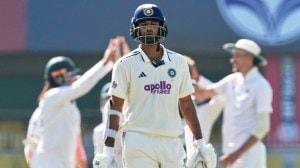Skidding on safety
Forty-Six new trains. No increase in passenger fares. More sops and subsidies. Laloo Prasad Yadav’s budget 2005-06 seems the perfect re...

Forty-Six new trains. No increase in passenger fares. More sops and subsidies. Laloo Prasad Yadav’s budget 2005-06 seems the perfect recipe for derailing railway finances further and punching more holes in its safety net.
Officials responsible for safety and traffic in the railways say they had warned against introducing more trains and had a made a strong case for improving track condition and capacity instead. ‘‘However, the Minister went ahead and announced an unprecedented number of trains,’’ an officer told The Indian Express.
And, that when the railways has failed to start more than half of the 32 trains promised in the last budget. Of the 17 Jan Sampark Kranti trains only four have been introduced so far.
‘‘There is no guarantee that all the 46 trains announced today will start operations. Most of the lines are already saturated. There is no time for maintaining the tracks. On the Delhi-Allahabad route, for example, there is not even a two-hour space when the track can be blocked for maintenance. Safety is a major concern,’’ said an official from the Track Directorate.
The Delhi-Allahabad route, for example, which has a capacity of 60 trains per day, is used to run 160 trains. More than 75 sections have been identified where the rail traffic is so high that there is absolutely no time for maintenance. A minimum of two hours is needed per day to put the track through Ultrasonic Flaw Detection test to look for fractures.
‘‘Instead of starting new trains, which only add to the losses, the railways would do much better to stress on track maintenance and improving the track capacity. It would surely prevent many of the derailments that happen due to rail fractures,’’ the official added.
Too many passenger trains also lead to loss of punctuality and obstruct freight traffic, which earns more than 70 per cent revenue for the railways.
‘‘The minister’s refusal to increase passenger fares is preventing a balanced growth of railway finances,’’ the official said. Laloo had gone ahead with a 7.7 per cent increase in freight in November, 2004, causing a shift of traffic to the road sector.
‘‘Measures like that reduce the budget exercise to a farce. If freight charges and fares can be increased at any time by the Railway Board, what is the point of having a budget,’’ an official asked.
Announcement of more sops and subsidies is bound to stretch the railways finances even further. Laloo may have shown an 8.7 per cent increase in passenger travel but hidden in the figures is the fact that the railways lost Rs 400 crore in upper class travel.
Buzzzz…
• Laloo had failed to come out with any revolutionary measure for the growth and development of the train network
— Sushma Swaraj, BJP
• It would not have mattered even if the rail budget had not been presented. Only 10 per cent of the new trains, announced in last year’s budget, were running
— V.K. Malhotra, BJP
• No innovative measures were proposed to raise tariff. There was no hike in freight charges but the reclassification of items would have an adverse impact on prices of certain essential commodities. Revenue earnings could have been increased by an additional Rs 5,000 crore had measures like enhancing line capacity, doubling of tracks connecting industries and reducing the turnover of wagons been taken
— Basudeb Acharia, Nilotpal Basu, CPI-M
• Freight shoukld have been made more competitive and transparent
— Abani Roy, RSP



- 01
- 02
- 03
- 04
- 05




























